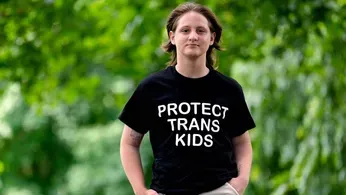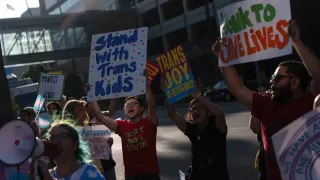
Jun 19
Families of Trans Kids Worry about What's Next After Supreme Court Rules on Gender-Affirming Care
Jonathan Mattise, Geoff Mulvihill, and John Seewer READ TIME: 4 MIN.
A U.S. Supreme Court decision Wednesday upholding Tennessee's ban on gender-affirming care for minors is leaving transgender children and their parents uncertain and anxious about the future.
The court handed President Donald Trump's administration and Republican-led states a significant victory by effectively protecting them from at least some of the legal challenges against many efforts to repeal safeguards for transgender people.
The case stems from a Tennessee law banning puberty blockers and hormone treatments for transgender minors. Opponents of gender-affirming care say people who transition when they're young could later regret it.
Families of transgender children argue the ban amounts to unlawful sex discrimination and violates the constitutional rights of vulnerable Americans.
Student says ruling creates an unwelcome world
Eli Givens, who is transgender and testified against Tennessee's gender-affirming care bill in 2023, said it's devastating that lawmakers "who have called us degenerates, have told us that we're living in fiction" are celebrating the court's ruling.
The nonbinary college student from Spring Hill received mastectomy surgery in 2022 at age 17. They said the legislation inspired their advocacy, and they attended the Supreme Court arguments in the case last December, on their 20th birthday.
"We're not making a world that trans youth are welcomed or allowed to be a part of," Givens said. "And so, it's just a really scary kind of future we might have."
Jennifer Solomon, who supports parents and families at the LGBTQ+ rights group Equality Florida, called the ruling a decision "that one day will embarrass the courts."
"This is a decision that every parent should be concerned about," she said. "When politicians are able to make a decision that overrides your ability to medically make decisions for your children, every family should worry."
Conservative activists take credit
Chloe Cole, a conservative activist known for speaking about her gender-transition reversal, posted on social media after the court's decision that "every child in America is now safer."
Cole was cited as an example by Tennessee Republicans as one of the reasons the law was needed.
Matt Walsh, an activist who was one of the early backers of Tennessee's law, applauded the high court. Three years ago, Walsh shared videos on social media of a doctor saying gender-affirming procedures are "huge moneymakers" for hospitals and a staffer saying anyone with a religious objection should quit.
"This is a truly historic victory and I'm grateful to be a part of it, along with so many others who have fought relentlessly for years," Walsh posted on social media.
Fears of what's next after Supreme Court decision
Rosie Emrich is worried the court decision will embolden legislators in New Hampshire, where legislation banning hormone treatments and puberty blockers for children is expected to reach the governor's desk.
Lawmakers are weighing whether to block the treatments from minors already receiving them, like Emrich's 9-year-old child.
"It's definitely disappointing, and I'm trying to figure out how I'm going to talk to my kid about it," Emrich said.
Emrich said she and her husband have considered moving from New Hampshire and are waiting to see what will happen.
"The hard part is, like, I've grown up here, my husband has grown up here, we very much want to raise our family here," she said. "And we don't want to leave if we don t have to."
A move across the country and other hurdles
Erica Barker and her family moved from Jackson, Mississippi, to North Las Vegas, Nevada, a little over two years ago so one of her children could start receiving gender-affirming care.
Barker's transgender daughter, then 12, had been in therapy for three years, and the family agreed it was time for medical treatments.
Mississippi passed a ban on gender-affirming care for minors the next year, which Barker said she saw coming.
Barker said the move was complicated, involving a new job for her husband and two mortgages when their Mississippi home was slow to sell, but it also brought access to care for her daughter, now 14.
"Our hearts are hurting for folks who are not having the same experience," Barker said.
In another state with a ban on gender-affirming care for minors, Oklahoma resident Erika Dubose said finding care for her 17-year-old nonbinary child, Sydney Gebhardt, involves a four-hour drive to Kansas and getting prescriptions filled in Oregon and mailed to their home.
"I just wish the younger folks wouldn't have to go through this," Gebhardt said. "These folks deserve to be focusing on their academics and hanging out with their friends and making memories with their families and planning out a safe and happy future."
Mother says gender-affirming care saves lives
Sarah Moskanos, who lives near Milwaukee, said her 14-year-old transgender daughter went through nearly a decade of counseling before she started medical gender-affirming care but has been sure since the age of 4 that she identified as a girl.
"I would say that there is decades of research on this very thing," she said. "And we know what works and we know what will save trans kids' lives is gender-affirming care."
Wisconsin doesn't have a gender-affirming care ban, but Moskanos said getting her daughter that care has not been easy. She now worries about what the future holds.
"We are but one election cycle away from disaster for my kid," she said.
Vowing not to disappear
Mo Jenkins, a 26-year-old transgender Texas native and legislative staffer at the state Capitol, said she began taking hormone therapy at 16 years old and has been on and off treatment since then.
"My transition was out of survival," Jenkins said.
Texas outlawed gender-affirming care for minors two years ago, and in May, the Legislature passed a bill tightly defining a man and a woman by their sex characteristics.
"I'm not surprised at the ruling. I am disheartened," Jenkins said. "Trans people are not going to disappear."
___
Mulvihill reported from Cherry Hill, New Jersey, and Seewer reported from Toledo, Ohio. Associated Press journalists Susan Haigh in Hartford, Connecticut; Kenya Hunter in Atlanta; Laura Bargfeld in Chicago; Nadia Lathan in Austin, Texas; and Daniel Kozin in Pinecrest, Florida, contributed to this report.







